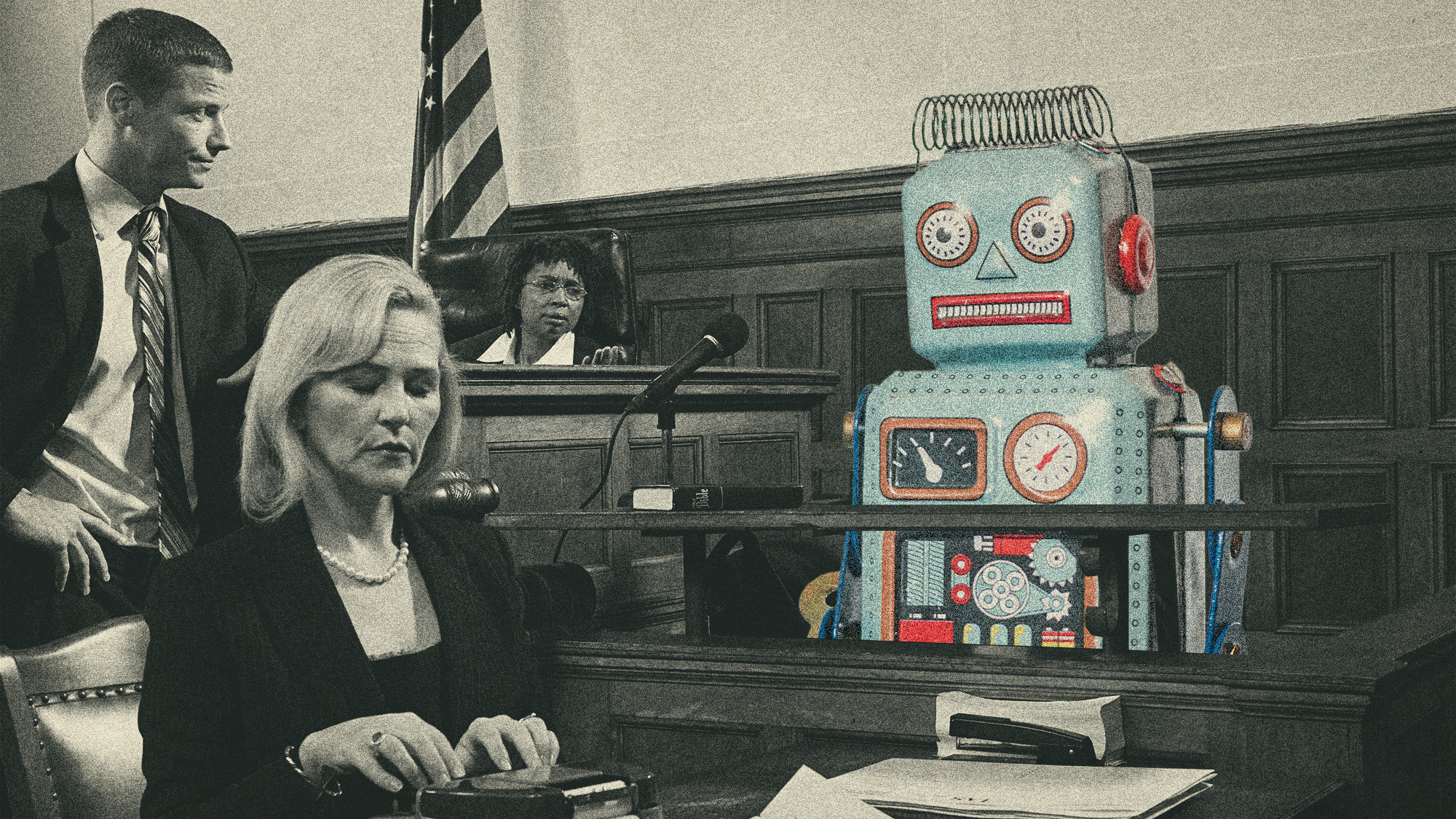Catfishing: what the law says
Campaigners are calling for online deception to become a specific criminal offence

A free daily email with the biggest news stories of the day – and the best features from TheWeek.com
You are now subscribed
Your newsletter sign-up was successful
Hit podcasts and Netflix documentaries about real-life catfishing cases have sparked fresh debate about internet safety laws.
Podcast series Sweet Bobby revealed how a London woman in her 30s was tricked into a ten-year online relationship with some pretending to be her boyfriend, while Netflix show The Tinder Swindler tells how a group of women were scammed out of hundreds of thousands of dollars via the dating app.
The success of the shows has helped to ensure that “keeping safe online remains a very hot and necessary topic”, said Metro. But Kirat Assi, the British woman duped into falling in love with “Bobby”, told The Times that law changes were also needed to “serve as a deterrent” to catfishing scammers.
The Week
Escape your echo chamber. Get the facts behind the news, plus analysis from multiple perspectives.

Sign up for The Week's Free Newsletters
From our morning news briefing to a weekly Good News Newsletter, get the best of The Week delivered directly to your inbox.
From our morning news briefing to a weekly Good News Newsletter, get the best of The Week delivered directly to your inbox.
What is catfishing?
Catfishing “sounds like an exciting hobby, but language can sometimes conceal the insidious nature of abuse”, wrote Charlotte Proudman, an award-winning barrister at Goldsmith Chambers, in an article for The Guardian. “Perpetrators reel in victims by deceiving and manipulating them, pretending to be someone else and preying on their vulnerabilities to create emotional dependency. Then, when they have been duped into a relationship, they extract something from them – money or emotional pain.”
The term “catfishing” is believed to originate from the 2010 documentary Catfish, about a budding online relationship that takes an unexpected turn.
People who engage in catfishing may steal photos, videos and personal information to create a fake profile or website in order to fool their target – and such scams appear to be increasingly common.
A survey of more than 2,000 UK adults last year for BetMinded found that 20% of respondents had been catfished, “with 38% of 25-34 year-olds revealing they’ve fallen for a fake profile”, North Wales Live reported.
A free daily email with the biggest news stories of the day – and the best features from TheWeek.com
Remy Le Fevre, global head of communications at dating app Badoo, told Metro that as well as using someone else’s image or information to create a new social media or dating profile, “modern approaches to catfishing also involve people who stretch the truth, find ways of aligning their personality with your own likes and dislikes, or outwardly lying about things such as their height, age and/or job.
“These misrepresentations can be supported by using technology to ‘prove’ a version of themselves which isn’t real, such as editing images,” he added.
How can targets spot a potential catfish?
According to Metro, “alarm bells should ring if someone you’ve matched is really reluctant to meet up in person or constantly bails and attempts to reschedule keep falling through”.
Other warning signs include them avoiding phone or video calls, and asking for “money or favours” or for “sexy pics and videos”, said the paper. A catfish may also “go AWOL without any explanation”, come on “super strong”, and be “shifty about giving you different social media profiles”.
Age UK advises being wary if “you’ve searched their name on the internet but they don’t seem to exist” or “the photos don’t match the photos on their dating profile”. Also take care if “their stories sometimes conflict with each other, or don’t quite add up”, said the charity.
What are the laws on catfishing?
Catfishing “is not an offence in its own right”, said The Times. A 2014 review of social media and the law by the Lords Communications Committee concluded that sufficent laws were in place to prosecute criminal offences committed over social media.
Internet law specialists Cohen Davis solicitors explained that with the exception of harassment, “there are no criminal laws against impersonation on social media”.
But “while fake online profiles on social media might not by themselves be illegal”, the law firm added, “there are other activities that engage catfishing or fake online accounts that may turn otherwise lawful activity into activity which is unlawful”.
When does it cross the legal line?
Catfishing “might be illegal” if the fraudster obtained money or goods “due to the fraud”, said Cohen Davis.
A catfish could also be charged “with a number of non-consensual sex related criminal offences” if “romance fraud had led to sexual contact”, because “any consent given by the victim to the contact could be rendered void”, according to the firm.
And if a victim has handed over private information, they “may pursue a claim for breach of privacy against the fraudster in the civil courts”.
Planned changes to the Online Safety Bill will also require social media sites and search engines “to stamp out fraudsters and scammers on their platforms”, said the government.
Under the proposals, published earlier this year, search engines and platforms that host user-generated content, video-sharing or live streaming will have “a duty of care to protect users of their services from fraud committed by other users”, the government said. “This includes ‘catfishing’ romance scams.”
Why is catfishing making headlines?
The hit podcast Sweet Bobby, produced by Tortoise Media, has played a key role in bringing the issue of catfishing to the public’s attention and sparked a campaign for online deception to be made into a specific criminal offence.
The campaign is being spearheaded by Kirat Assi, who was drawn via Facebook into an online relationship with a cardiologist named Bobby, “a man who really exists and whom she in fact vaguely knew”, said The Times.
But “it wasn’t the real Bobby communicating with her but a younger female cousin of hers called Simran Bhogal using a fake profile”, the paper continued. “The relationship began as a friendship, became romantic, and lasted throughout Assi’s thirties.”
Over the course of a decade, Bhogal created a 50-strong cast of fake online personas, weaving together countless lies and fantastical tales that at one point involved Bobby dying and then coming back to life and going into a witness-protection programme.
Her “aim was not to extract money from Assi, but seemingly to make her believe she was in an authentic, romantic relationship”, wrote Proudman in The Guardian. Assi “described being controlled by Bobby as he monitored her movements and dictated her everyday life choices”, and claimed that the relationship had “a profound effect on her mental and physical health”.
Proudman said that “if this had of been a straightforward case of two authentic people in a relationship it would surely have screamed coercive control, which has been a criminal offence since 2015”. Instead, Assi reached a settlement in a civil case against Bhogal for harassment, misuse of private information and data protection breaches.
But “it should never have been left to a victim of abuse to pursue her perpetrator in the civil courts”, argued Proudman.
Assi told The Times that legal changes were needed so that would-be catfish “know that if you’re caught then immediately it’s a crime, just like driving with a mobile in your hand.
“It would be an immediate deterrent, so many people will still do it but some people will think, ‘I’m just not risking it’,” she said.
-
 How the FCC’s ‘equal time’ rule works
How the FCC’s ‘equal time’ rule worksIn the Spotlight The law is at the heart of the Colbert-CBS conflict
-
 What is the endgame in the DHS shutdown?
What is the endgame in the DHS shutdown?Today’s Big Question Democrats want to rein in ICE’s immigration crackdown
-
 ‘Poor time management isn’t just an inconvenience’
‘Poor time management isn’t just an inconvenience’Instant Opinion Opinion, comment and editorials of the day
-
 Why Britain is struggling to stop the ransomware cyberattacks
Why Britain is struggling to stop the ransomware cyberattacksThe Explainer New business models have greatly lowered barriers to entry for criminal hackers
-
 Who are the new-wave hackers bringing the world to a halt?
Who are the new-wave hackers bringing the world to a halt?The Explainer Individual groups and nations are beginning to form concerning partnerships with new ways to commit cybercrime
-
 Jaguar Land Rover’s cyber bailout
Jaguar Land Rover’s cyber bailoutTalking Point Should the government do more to protect business from the ‘cyber shockwave’?
-
 Airplane crash-detection systems could be vulnerable to hackers
Airplane crash-detection systems could be vulnerable to hackersUnder the Radar 'The idea scares the shit out of me,' one pilot said
-
 Questions arise over the use of an AI crime-fighting tool
Questions arise over the use of an AI crime-fighting toolUnder the Radar The tool was used in part to send a man to prison for life
-
 Why Captchas are getting harder to solve
Why Captchas are getting harder to solveUnder The Radar If the process continues to get harder, it could cause problems for people trying to book tickets for popular shows
-
 Data breaches increased in 2023 and with them, internet security concerns
Data breaches increased in 2023 and with them, internet security concernsThe Explainer One report found a 78% year-to-year increase in breaches from 2022 to 2023
-
 Cyberflashing, fake news and the new crimes in the Online Safety Act
Cyberflashing, fake news and the new crimes in the Online Safety ActThe Explainer UK's first conviction demonstrates scope of controversial law that critics describe as a threat to privacy and free speech